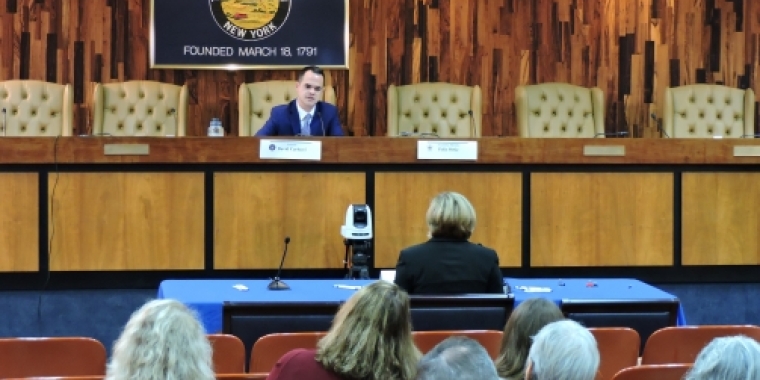
Senator David Carlucci Holds Hearing on Eating Disorder Prevention and Treatment
Senator David Carlucci
October 28, 2019
-
ISSUE:
- Eating Disorders

(New City, NY) Today the New York State Senate Mental Health and Developmental Disabilities Committee, chaired by Senator David Carlucci (D- Rockland/Westchester) held a public hearing at the Clarkstown Town Hall in New City on eating disorder prevention, treatment, and recovery.
“Eating disorders are all too common and can have life-threatening consequences,” said Senator David Carlucci. “As Chair of the Mental Health and Developmental Disabilities committee, I held today’s discussion to hear from advocates and those on the front lines treating people with eating disorders. With their testimony, the committee will work to improve mental health treatment for those suffering from eating disorders and look for ways to eliminate stigma and increase accessible care.”
“The National Association of Social Workers, New York State Chapter proudly supports Senator Carlucci and the NYS Senate Standing Committee on Mental Health and Developmental Disabilities as they lead the charge on combating one of the deadliest mental health issues facing the citizens of New York State," said Samantha Fletcher the Executive Director of the National Association of Social Workers, New York State Chapter. "At today’s hearing, Senator Carlucci spoke with great compassion and demonstrated an understanding of the complexity of eating disorders and the impact they have on the individual and larger community. With this initiative, Senator Carlucci continues to be a champion and advocate for people who struggle with mental health issues as well as the providers who serve them.”
A variety of State, County, and local agencies participated in the hearing, including the National Eating Disorders Association (NEDA), the National Association of Social Workers New York State Chapter, the Westchester County Department of Community Mental Health, the New York State Conference of Care Centers for Eating Disorders, Golisano Children’s Hospital at University of Rochester Medical Center, and Rockland Jewish Family Service. Advocates, social workers, and nutritionists also testified.
Testimony included topics of Anorexia Nervosa, Bulimia Nervosa, Binge Eating Disorder, Otherwise Specified Feeding or Eating Disorder (OSFED), Avoidant Restrictive Food Intake Disorder (ARFID), PICA, Rumination Disorder, Orthorexia, Diabulimia, and Compulsive Exercise.
Eating disorders include a range of abnormal or disturbed eating disorders that result from an unhealthy obsession with food, body weight or body image. Causes of eating disorders include genetic, biological, psychological and sociocultural factors. Consequences of these conditions can severely harm a person’s health, livelihood and relationships.
At least 30 million people suffer from an eating disorder, and every 62 minutes at least one person dies as a direct result from an eating disorder, according to the National Association of Anorexia Nervosa and Associated Disorders. Eating disorders are most common in adolescents and young women. A study by the Oregon Research Institute found that 13.1% of women, by the age of 20 will experience one or more forms of eating disorders. .
According to the National Eating Disorders Association, the chance for recovery increases the earlier an eating disorder is detected. Recovery is a long process that is dependent on a multidimensional process involving the support of friends, family, professionals and the community.
related legislation
Share this Article or Press Release
Newsroom
Go to NewsroomSmall Business Stimulus Resources
April 11, 2020

4/11 Coronavirus Update Stimulus
April 11, 2020

4/11 Coronavirus Stimulus Update
April 11, 2020

